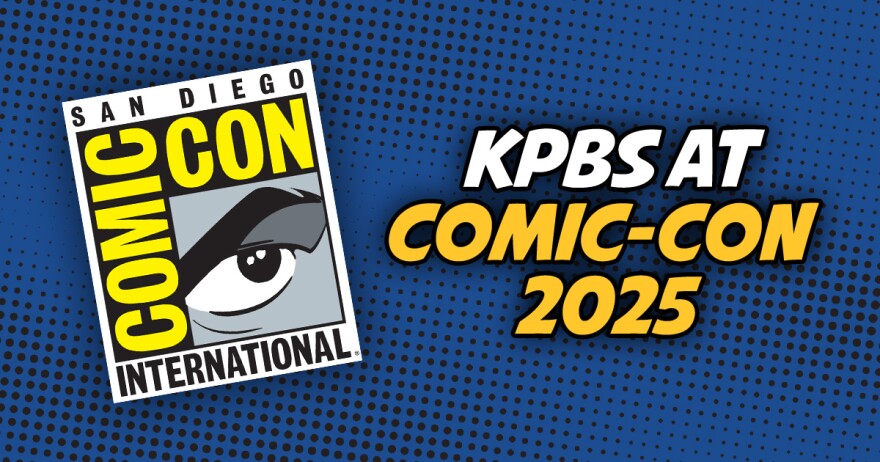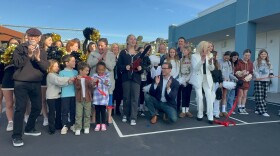So it begins! Comic-Con kicks off its 50th convention Wednesday night.
I remember my first Comic-Con — I could stand at the entrance to the dealer’s room and survey the entire floor. Now, the dealer’s room is a quarter-mile long with hundreds of exhibitors that include Golden and Silver Age comics, small press, webcomics, gaming, artist alley, Hollywood studios, collectibles, cosplay and even places to buy a dragon to keep on your shoulder or a tail to wear.
There are also hundreds of hours of mind-boggling diverse programming, ranging from panels on AfroFuturism and Queer Fear to the Anatomy of Choreographing an Action Film to the Science of the Acme Product Catalogue. You can learn how to build your own R2 unit or debate which is funnier, MAD Magazine or New Yorker cartoons. Then there are the delicious prospects of panels with titles like From OSHA Violation to Superhero: The Lab Accidents That Will Most Likely Give You Superpowers. In honor of the 50th Con there will also be a lot of programming looking to the event’s long history.
And if you don’t have a badge you can still attend panels at the not yet open Comic-Con Museum in Balboa Park (which will also have pop up exhibits) or Artists’ Loft at BarrioHaus.
“One of the things that we're doing this year, which is something we've long wanted to do and we have the ability to do that now is to have what we call community programming,” said David Glanzer, Comic-Con spokesman. “So this year the Comic-Con Museum will have its first-ever gala fundraiser on the first night of Comic-Con. But what we'll be able to do too is have programming throughout the weekend at the museum — and you don't need a Comic-Con badge for that. The same is true for BarrioHaus. We have a facility in Barrio Logan and the same will be true there, there will be a program that's open to the public. But that's something new and very exciting. We're hoping to get more community involvement even if you don't have a Comic-Con badge.”
You can also savor the possibilities of what might come up at the “Long Live the King of Kaiju Panel” when this is the description: “Godzilla has been a destructive force of legal liability since 1954. Who is financially responsible for acts of Godzilla? Does the United States have a duty to defend Japan? And just who is the legal owner of Mothra's egg? Hear from this panel of attorneys including U.S. Magistrate Judge Stacie Beckerman, Monte Cooper (grand nephew of the creator of King Kong, Merian Cooper), Kathy Steinman (deputy city attorney for the City of San Diego), Bethany Bengfort (U.S. Courts) and Joshua Gilliland (The Legal Geeks) as they wade into the depths of Godzilla's destructive legal issues over the last 65 years. Moderated by Matt Weinhold (Monster Party).”
So when you can find programming like this, does it really matter that a major studio has decided it has nothing to promote this year and has given up its Hall H spot? My answer is no.
Although I have loved some of the big studio Hall H presentations, those hard to get in panels are not what I am most interested in. Those exclusive clips will eventually hit YouTube and the panels will likely be posted by the studios and while it’s fun to be the first to know some casting news or what’s coming next in a franchise, the moments I most cherish are usually from smaller panels that no one films and it will only exist in the memories of those who were there.
My favorite panel memory might be of Simon Pegg and Edgar Wright and other cast members of their TV show “Spaced” spontaneously breaking out into a pantomimed slow-motion shootout with the audience, riffing on what happens in one of the episodes. Similarly, Quick Draw (think cartooning improv) and Starship Smackdown (a kind of sweet 16 battle between teams of spaceships and captains argued out by geeks) always provide wildly entertaining, one-of-a-kind experiences. So I won’t be missing Warner Bros. this year.
But I did notice that the studio’s absence got some fans commenting about the reasons why the studio wasn’t going to be using its Hall H time. Some said it was because the studio did not want to pay a panel fee, while others said it was because Comic-Con did not want to pay the celebrities to come. Glanzer said neither of those things is correct.
“I think there is a misconception that we either pay for celebrity appearances or that a studio pays for a time slot," Glanzer said. "Both of those are not true. We have good relationships with the studios and networks and if a studio doesn't come often times it's because whatever projects they want to promote either aren't fully developed or they don't feel they have something strong enough to present to our fans. So sometimes studios come and sometimes they don't. It's really less of an indicator of their desire and more of a — I think — savvy understanding of the fan community and making sure that what they want to bring is something that the fans will enjoy and be able to get excited about.”
Glanzer has been the spokesman for Comic-Con since 1984 and has noticed a lot of changes.
“I think it is a very different landscape than it was,” Glanzer said. “One of the things that we've always done is try to put on the type of event we want to enjoy ourselves because we're all fans. I think people forget that when we started our main focus was comic books, films and science fiction and fantasy literature, three areas of entertainment that we thought of as art but lot of people didn't. They thought of it as just disposable entertainment. I think that's why there are a lot of comic books that don't exist. People read them and threw them away years ago because they didn't think anything was intrinsically artistic about it to keep it, it was just entertainment.”
The convention has changed over the years, but so too has the comics industry. DC Comics and Marvel Comics now brand themselves as DC Entertainment and Marvel Entertainment to reflect all they do in comics, TV, movies and video gaming. They are everywhere. Glanzer noted that Comic-Con’s evolution has been along a parallel course of expansion.
“I think one of the things that's kept us vibrant and one of the things that has kept us as popular as we are is that we do change,” Glanzer said. “And it's really a reflection of art. Like I said, we're fans ourselves and try to put on the type of event we want to attend. We have new people who come in all the time and say, ‘Oh, you know what about this, and we should have a panel on this,’ and that's great because that stuff is speaking to a new younger audience. So yes I think there is an evolution if you will. I don't think we'll ever lose the essence of what Comic-Con is, which is a love of all forms of art that people may not realize is art. But wow. The horizon is certainly vast in terms of what the future holds. And what is art? I'm excited.”

This year there will also be tribute panels to a number of people who have died and will be sadly missed at the convention, comics legend Stan Lee, San Diego-based cartoonist and writer Batton Lash, and Comic-Con’s president John Rogers.
Comic-Con runs through Sunday with its main base at the San Diego Convention Center.
Here are just a few suggested panels, but I urge you to read through the online schedule for gems that might suit your particular "geekery." And for shameless self-promotion, I will be moderating a panel for Mysterious Galaxy called From Between the Pages to on the Marquee, about translating books to film and TV at 11 a.m., Sunday, in Room 28DE.
THURSDAY
— The Forgotten Trio: Colorists, Inkers, and Letterers, 11 a.m. - Noon, Room 9;
— Afro-futurism, “Black to the Future Too”: The Revenge (This Time, It’s Personal), 11:30 a.m. - 12:30 p.m., Room 24ABC;
— Comics Go Global: Foreign Rights Licensing, 1 p.m. - 2 p.m., Room 9;
— Art During the Holocaust, 1:30 p.m. - 2:30 p.m., Room 4;
— The Science of the Acme Product Catalogue, 2 p.m. - 3 p.m., Room The Theater, Comic-Con Museum;
— From OSHA Violation to Superhero: The Lab Accidents That Will Most Likely Give You Superpowers, 7 p.m. - 8 p.m., Room 6DE;
— Learn Japanese to Read Manga and Watch Anime, 6:30 p.m. - 7:30 p.m., Room 2.
FRIDAY
— Pinball and Comics, 10 a.m. - 11 a.m., Room Grand 12 & 13, Marriott Marquis San Diego Marina;
— Excelsior! Remembering Stan Lee, Noon - 1 p.m., Room 28DE;
— MAD vs. New Yorker Cartoons: Which Are Funnier 7:30 p.m. - 8:30 p.m., Room 24ABC;
— Queer Fear: 7 p.m. - 8 p.m., Room 28DE;
— Animated Avocados from Mexico to Hollywood, 7:30 p.m. - 8:30 p.m., Room 26AB;
— Judges on The Clone Wars, 8 p.m. - 9 p.m., Room 7AB.
SATURDAY
— Memories of the First Comic-Con, 10 a.m. - 11 a.m., Room 28DE;
— Preservation of Comic Arts, 11 a.m. - Noon, Room Grand 12 & 13, Marriott Marquis San Diego Marina;
— CBLDF: Teaching with Comics, 1 p.m. - 2 p.m., Room 11;
— George Takei: They Called Us Enemy, 1 p.m. - 2 p.m., Room 25ABC;
— Gaming Creator Connection, 1 p.m. - 3 p.m., Room Santa Rosa Room, Marriott Marquis San Diego Marina;
— The “A” Team of Global Education, 3:30 p.m. - 4:30 p.m., Room 24ABC;
— Artist Alley Everywhere, 2 p.m. - 3 p.m., Room 25ABC;
— Black and Queer in Popular Media, 6 p.m. - 7 p.m., Room 29AB;
— Long Live the King of Kaiju: Lawyers on the 65th Anniversary of Godzilla, 7:30 p.m. - 8:30 p.m. Room 26AB.
SUNDAY
— R2-Builders Panel, 10 a.m. - 11 a.m., Room 11;
— A Tribute to Cartoonist Batton Lash, 10 a.m. - 11 a.m., Room 24ABC;
— Children’s Literary Agents, 10:30 a.m. - 11:30 a.m., Room 8;
— Diversity in Comics: Indian Superheroes Go Global!, 2 p.m. - 3 p.m., Room 28DE;
— Super Asian America, 2:45 p.m. - 3:45 p.m., Room 5AB;
— Starship Smackdown: We Built This Starship on Rock and Roll Edition, 2:45 p.m. - 4:45 p.m., Room 6A;
— John Rogers Memorial, 3:30 p.m. - 4:30 p.m., Room 23ABC;
— Gastronomically Geeky. Game and Movie Cookbooks, 3:45 p.m. - 4:45 p.m., Room 5AB








